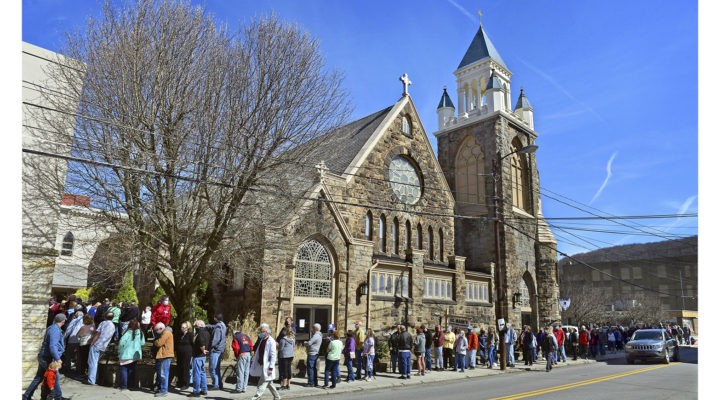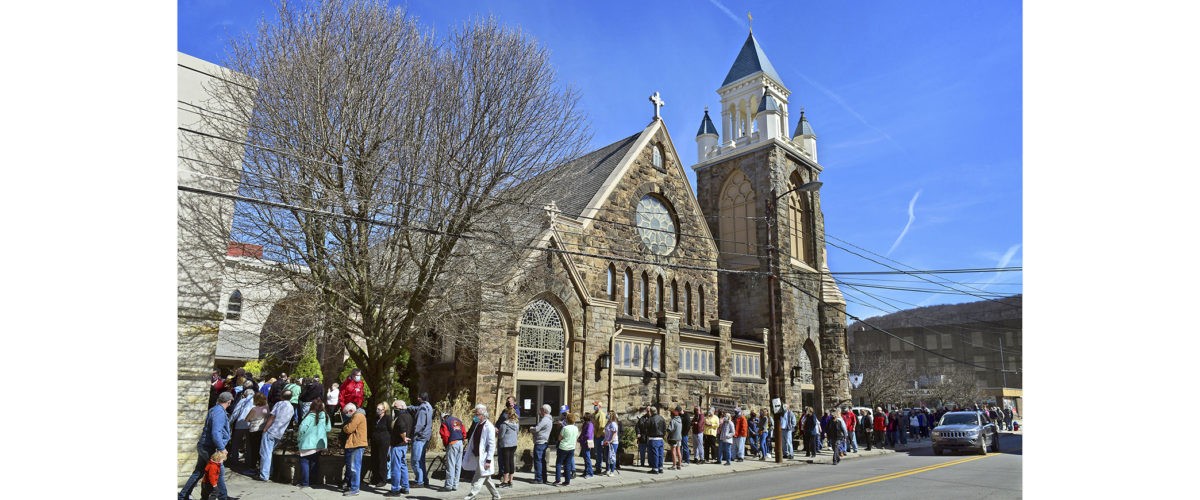Aversion to COVID-19 vaccines is declining in the U.S. in part because faith communities are influencing some skeptical Americans to reconsider their opposition to vaccination, new research shows.
A survey conducted in June by Public Religion Research Institute and Interfaith Youth Core found that faith-based approaches to promoting vaccines are eroding vaccine hesitancy among white evangelical Christians and other groups known to be suspicious of the injections that prevent the spread of coronavirus.
“The hesitancy rate has been cut in half between March and June. That’s a big deal,” PRRI head Robert P. Jones said during a July 28 online forum on findings of the study titled “Religious Identities and the Race Against the Virus.”
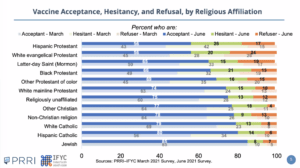 Religious groups have an inside track as influencers because they often are trusted leaders and allies in their neighborhoods, IFYC President Eboo Patel said during the forum. “They are integrated into the community and understand where the community shows up and feels comfortable and speak to them in a language they understand.”
Religious groups have an inside track as influencers because they often are trusted leaders and allies in their neighborhoods, IFYC President Eboo Patel said during the forum. “They are integrated into the community and understand where the community shows up and feels comfortable and speak to them in a language they understand.”
The survey, like its March predecessor, examined the role of religion in vaccine acceptance and also gauged wider trends nationally.
Overall vaccination rates
“Two-thirds of Americans (67%) report having received at least one dose of a vaccine, and another 4% say they will get vaccinated as soon as possible,” according to the survey. “Less than one in five (15%) are hesitant, a decrease from 28% in March, and 13% say they will not get vaccinated, similar to the 14% who said they would not get vaccinated in March.”
Those self-reported vaccination rates run about 10 points higher than the official numbers reported by the U.S. Centers for Disease Control, which knows how many doses actually have been administered. As of July 25, 57% of Americans were known to have received at least one dose of vaccine, and 49% were known to have been fully vaccinated.
Faith-based approaches are working
Researchers with PRRI and IFYC reported that 38% of vaccine-hesitant Americans who attend at least a few religious services annually say that faith-based approaches still might encourage them to get the shots.
Those approaches, which already are in use by IFYC and its faith-based and nonprofit partners, include receiving encouragement from religious leaders or trusted congregants, religious groups hosting vaccination forums or vaccination clinics, and knowing clergy and fellow congregants who have been vaccinated.
“Even among refusers, these approaches could be effective,” the survey found. “Nearly one in five Americans who are vaccine refusers (19%) also say one or more faith-based approaches would make them more likely to get vaccinated.”
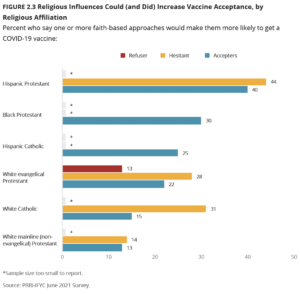 Comparing data from the March and June studies shows the approach has made a difference in the last three months.
Comparing data from the March and June studies shows the approach has made a difference in the last three months.
“Among religious groups, Hispanic Catholics have increased most in vaccine acceptance, from 56% in March to 80% in June. Nearly eight in 10 white Catholics (79%) are also vaccine accepters, up from 68% in March. Other non-Christians (78%), other Christians (77%), the religiously unaffiliated (75%), and white mainline Protestants (74%) are also above the 70% mark, with increases of 11 to 15 percentage points in each group.”
The influence of parish life played a big part for Catholics, the survey said. “Of those who are vaccinated, 15% of white Catholics, and 25% among those who attend religious services, say one or more faith-based approaches mattered.”
Black Protestants and Latter-Day Saints saw similar percentage point increases from March to June, to top 66% and 65%, respectively, researchers noted.
“Hispanic Protestants and white evangelical Protestants remain the least likely religious groups to be vaccine accepters (56% for both groups), but both groups nonetheless saw double-digit increases in acceptance since March.”
There’s still hope for white evangelicals
The church factor is likely to be significant for white evangelicals still reluctant to consider vaccination. Nearly a third of that group who attend services say one or more faith-based approaches would make them more likely to get vaccinated, researchers found. “Among those who are vaccinated and attend services, more than one in four white evangelical Protestants say one or more faith-based approaches encouraged them to get vaccinated.”
The influential role of faith on vaccination acceptance must be capitalized on by religious, health and nonprofit groups, Patel said. “The numbers of people who have moved from hesitant to acceptant are quite remarkable. We need to be focusing our efforts on encouraging the uncomfortable and vaccinating the persuaded.”
“We need to be focusing our efforts on encouraging the uncomfortable and vaccinating the persuaded.”
He explained that IFYC has been working with more than 100 universities, civic groups and religious groups to educate Americans about the benefits of vaccines. It partnered with PRRI to conduct the study in part to verify the effectiveness of faith-group involvement in growing vaccine acceptance.
Why faith-based approaches work
People and communities of faith are key to increasing vaccination rates partly because they are equipped to help Americans through many of the barriers to vaccination, including health conditions, transportation, child care, time constraints and hunger, Patel said.
Churches, temples and mosques often have ready-made volunteer pools to provide meals, babysit children and drive vans to vaccination sites. “This is not rocket science. This is totally doable,” Patel said.
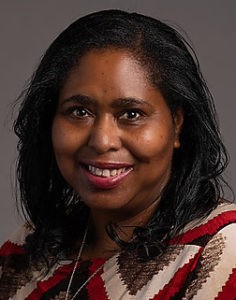
Tanya Sorrell
The faith-based approach to promoting vaccinations can be especially powerful for helping Black Americans and other people of color overcome longstanding and justified distrust of institutional medicine, said Tanya Sorrell, an associate professor at Rush University Medical Center in Chicago and an expert on medically underserved communities.
Faith-based approaches also counter views that religion and medicine are in conflict, she added. “This shows that science and the faith community can walk hand in hand.”
Faith-based approaches somewhat overcome politics
In another bit of good news, the research found these faith-based methods are effective even when political affiliation and other factors are considered.
“Those who most trust far-right news outlets (46%) have become more likely than they were in March (31%) to refuse vaccination.”
“Republicans remain less likely than independents or Democrats to be vaccine accepters but have increased from 45% accepter in March to 63% in June, a larger gain than independents (58% to 71%) or Democrats (73% to 85%),” the survey found. “However, Republicans remain divided by what media they trust. Those who most trust far-right news outlets (46%) have become more likely than they were in March (31%) to refuse vaccination.”
Americans under age 50, those living in rural areas and Republicans represent the three largest groups of the vaccine hesitance and refusal, researchers said. However, “about one in five of those who are vaccinated in each of these groups —those under 50 (19%), Republicans (20%), and rural Americans (20%) — say one or more of these faith-based approaches helped convince them to get vaccinated.”
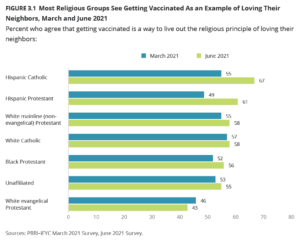 Natalie Jackson, director of research at PRRI, added that some religiously unaffiliated Americans, who make up a quarter of the population, display an openness to faith-based approaches to vaccine acceptance as well. “Our society is so deeply connected by religion that even 12% of the religiously unaffiliated said faith-based approaches could move them toward vaccination.”
Natalie Jackson, director of research at PRRI, added that some religiously unaffiliated Americans, who make up a quarter of the population, display an openness to faith-based approaches to vaccine acceptance as well. “Our society is so deeply connected by religion that even 12% of the religiously unaffiliated said faith-based approaches could move them toward vaccination.”
Likewise, a majority of Americans, regardless of faith affiliation, agreed that being vaccinated against COVID-19 is a way of “loving my neighbors,” the survey found. This question found increased acceptance across all groups over the past three months.
Roberts said the idea needs to be driven home for those suspicious of vaccines, and especially for white evangelicals and Hispanic Protestants, that vaccination is a way of protecting human life and protecting the vulnerable in their midst.
The survey proves the effort can pay off, he added. “The hesitant and refusers continue to tell us that these approaches would make them more likely to get vaccinated.”
Related articles:
In their own words: Young faith leaders on why young adults should get vaccinated
Francis Collins: ‘Give God the glory’ for vaccines ‘but roll up your sleeve’
I’m an infectious disease doctor: Here’s why pastors need to lead their flocks to be vaccinated | Opinion by Leland Allen III
Repeating Exodus through vaccine denial | Opinion by Wendell Griffen

